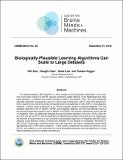Biologically-Plausible Learning Algorithms Can Scale to Large Datasets
Author(s)
Xiao, Will; Chen, Honglin; Liao, Qianli; Poggio, Tomaso
DownloadCBMM-Memo-092.pdf (1.170Mb)
Metadata
Show full item recordAbstract
The backpropagation (BP) algorithm is often thought to be biologically implausible in the brain. One of the main reasons is that BP requires symmetric weight matrices in the feedforward and feed- back pathways. To address this “weight transport problem” (Grossberg, 1987), two more biologically plausible algorithms, proposed by Liao et al. (2016) and Lillicrap et al. (2016), relax BP’s weight symmetry requirements and demonstrate comparable learning capabilities to that of BP on small datasets. However, a recent study by Bartunov et al. (2018) evaluate variants of target-propagation (TP) and feedback alignment (FA) on MINIST, CIFAR, and ImageNet datasets, and find that although many of the proposed algorithms perform well on MNIST and CIFAR, they perform significantly worse than BP on ImageNet. Here, we additionally evaluate the sign-symmetry algorithm (Liao et al., 2016), which differs from both BP and FA in that the feedback and feedforward weights share signs but not magnitudes. We examine the performance of sign-symmetry and feedback alignment on ImageNet and MS COCO datasets using different network architectures (ResNet-18 and AlexNet for ImageNet, RetinaNet for MS COCO). Surprisingly, networks trained with sign-symmetry can attain classification performance approaching that of BP-trained networks. These results complement the study by Bartunov et al. (2018), and establish a new benchmark for future biologically plausible learning algorithms on more difficult datasets and more complex architectures.
Date issued
2018-09-27Publisher
Center for Brains, Minds and Machines (CBMM)
Series/Report no.
CBMM Memo Series;092
Keywords
backpropagation, feedback alignment, sign-symmetry algorithm